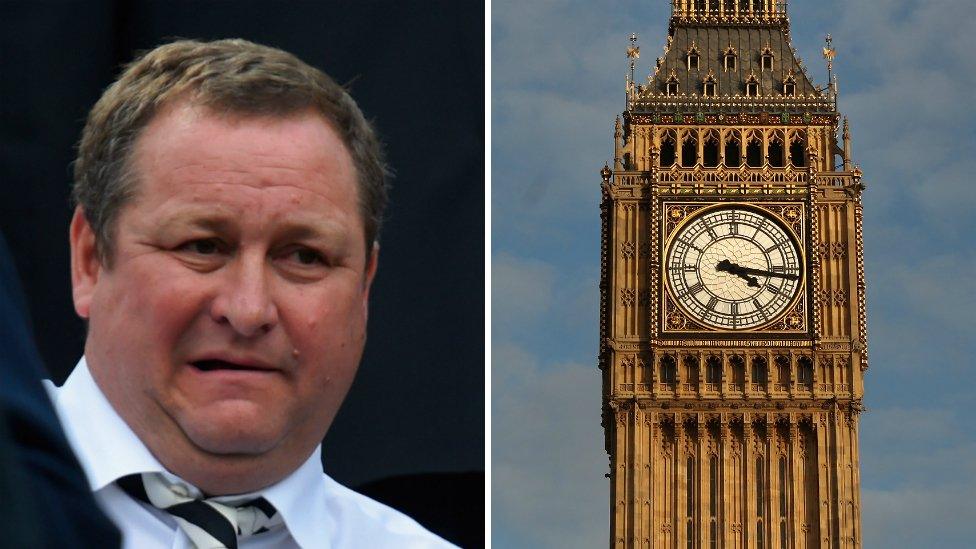Silent witness?
- Published
- comments
During Thursday's Business Statement, Chris Bryant called for non-appearance before a select committee to be "a criminal offence".
Sooner or later, and it may well be sooner, there is going to be a serious test of the power of Commons select committees to summon unwilling witnesses to give evidence before them.
A number of "refusenik" cases are piling up.
Top of the list is Mike Ashley, the owner of Sports Direct, who, after refusing earlier invitations, has been summoned to give evidence to the BIS Committee on 7 June, and so far shows no sign of being prepared to appear.
And there's also the case of Matthew Elliott, chief executive of Vote Leave, external, who has displeased the Treasury Committee by failing to appear for its Brexit inquiry.
If a witness declines a select committee summons, their refusal can be treated as a matter of Parliamentary privilege, which would require the committee to seek leave from the Speaker to bring a motion before the House of Commons.
Were the motion to be passed, we could then have the entertaining sight of the Serjeant at Arms, external, in full regalia, setting off to apprehend the miscreant and bring them to Westminster. Except for the minor difficulty that the Serjeant has no powers of arrest or entry, and the police would have no legal basis to assist him, so the whole thing could become rather embarrassing.
The reality is that the House's powers to compel reluctant witnesses are legally pretty shaky. But witnesses could find that there is a price to pay if they refuse to turn up. Rupert Murdoch originally declined a request from the Culture, Media and Sport Committee to give evidence on phone hacking - but eventually did attend the session where he was, famously, custard-pied. Why? Because his company was suddenly facing considerable reputational damage over phone-hacking, and possibly because suggestions were made that a failure to appear could lead to questions about whether he was a "fit and proper person" to run a TV company in the UK.
Chris Grayling promises action on select committee witnesses who refuse to attend hearings
Such considerations will not apply to all witnesses.
So what happens if someone either refuses point-blank, or simply fails to turn up at the appointed hour?
Here the plot thickens.
It is possible to imagine that there may not be unanimous support for going nuclear and treating non-attendance as a matter of privilege. This could manifest itself on the select committee in question, or at the Liaison Committee (the super-committee of all select committee chairs) which might also wish to weigh in. Or a motion to the House might be opposed by some MPs, especially if the government, for whatever reason, wasn't keen.
The motion could either condemn refusal by the witness, or, more likely, refer the issue to the Privileges Committee - so that the original committee would not be acting as judge and jury in hearing its own complaint. It would also give the reluctant witness another opportunity to comply, or to make their case to the Privileges Committee itself. But any hint of dissent or doubt among MPs would weaken the pressure on them to play ball.
So suppose the witness remains obdurate? The Privileges Committee would be left with little option but to rule that their refusal was contempt of Parliament.
Historic procedure
At that point they hit real difficulties; the Commons' ancient powers to fine, or even jail, offenders are incompatible with human rights law. No-one has been fined by the Commons since 1666, and no-one has been jailed for contempt since 1880.
The alternative of summoning the witness to the Bar of the House for a telling-off by Mr Speaker is fraught with danger; they might refuse to appear, at which point we're back to Square 1, or they might turn up and stage an embarrassing, and televised, scene by answering back as the Speaker attempted to rebuke them.
There are, however, other sanctions - the Privileges Committee could recommend that the offender should be formally "admonished" by a resolution of the House, after a fair process of investigation had established that they were in contempt; that could have all kinds of implications - they could be disqualified as a company director, or lose "fit and proper person" status to hold some kind of licence in the UK.
And similar issues might arise if the witness did appear, if they were to be over-combative, or if they refused to answer certain questions.
Today's news that Sir Philip Green is prepared to appear before the BIS and Work and Pensions committees, to answer questions arising out of the troubles of BHS, removes one possible refusenik from the list accumulating on the committee corridor - but there could be a real issue about what he was able to say while under investigation by the Insolvency Service.
So all of this awaits a test case.
- Published16 March 2016
